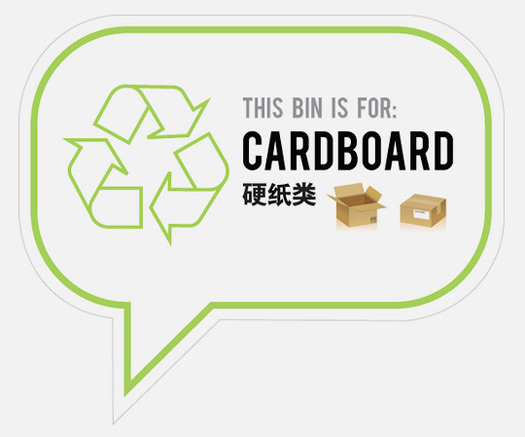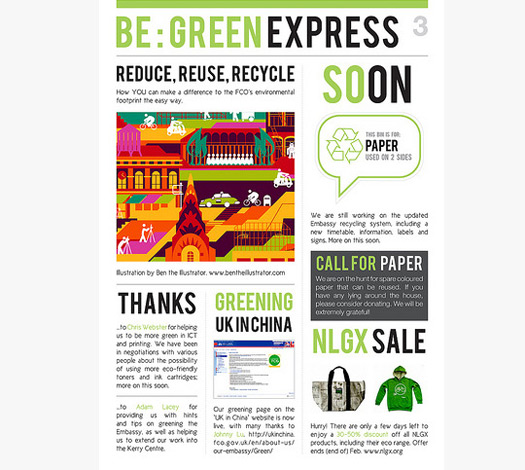
Bilingual sign for the British Embassy Beijing's new recycling system.
Earlier this year, Great Britain’s former foreign secretary, David Miliband, visited Beijing to foster greater dialogue between the UK and China about low carbon economic development. We — the UK — deliver more joint policy and engage in more technical and educational work with China on climate change and low carbon development than any other country. What is the value in this, however, if we are not leading by example?
This is the very reason I accepted the Greening and Environmental Support Officer job at the British Embassy Beijing, which simply entails reducing our carbon footprint. “Simply” may be a misleading word; working in China and in an embassy with zero budget means that even straightforward solutions, such as implementing a recycling system, pose a challenge. However, re-education is key, and the most effective means of bringing about transformation is by altering individual habits. Collectively, these small changes could lead to massive change.
One of the first things we did was to sign up to the 10:10 campaign (launched in London last September), in a pledge to reduce the Embassy’s carbon emissions by 10 percent in 2010. 10:10 has also brought us closer to the British Council (which is based in a different building), and we are now collaborating on a tree-planting event to take place at Beijing’s Botanical Gardens. Ideally, this will generate a buzz about greening outside the office and bring together those who would not usually congregate during working hours. This will be an opportunity to foster dialogue, as well as enthusiasm.

Cover of Be:Green Express newsletter, Issue 3.
After we put together a carbon footprint report for 2009, specific areas of high carbon emissions became evident. I initiated a series of mini-campaigns based on these areas — waste, transport and energy — which made the work manageable and easier to focus. The first mini-campaign was called “Reduce, Reuse, Recycle,” and approached Embassy waste; we introduced composting and a more intricate scheme for recycling that separates paper used on one and two sides, cardboard and plastics/glass/metal. Paper that can be re-used is sorted and made into notepads.
As we put systems into place, we are trying to get people more energized about being environmentally friendly. One way to do this is via good design. For our present recycling system, for instance, I worked on new, visually appealing labels that had more information. The goal is to make recycling, a monotonous and dreary practice for most, not just imperative but also interesting.
Our current transport campaign has overseen changes to the Embassy fleet, where energy efficiency is now taken into consideration when new vehicles are purchased. Recent changes mean we now own three hybrids and are on schedule to achieve a 12 percent reduction in transport carbon emissions. Planned initiatives to educate local staff in green driving and a greener car-booking system (where priority is given to greener vehicles) aims to reduce emissions further. Additionally, we have provided each Embassy section with a target to replace one in ten flights with a train journey or video conferencing. The Ambassador has led the way by taking an overnight train to Shanghai.

Notice on energy conservation measures
The Embassy itself is split over two buildings, which means that we have to spread our work very thinly. I am also trying to involve local NGOs and organizations wherever possible through, for example, lunchtime talks with Greenpeace China. But I have now started to involve the really local Chinese market; after weeks of organization with security and domestic staff, we have managed to set up a scheme where our divided waste is collected by a Chinese couple that survives by recycling items for money. Recycling in China is completed in a down-up (rather than top-down) chain; arguably, this is better as it means the poor can actually benefit from our waste. We can then offer these recyclers an alternative advertising platform and spread the word across the expat community.
Finally, a dedicated greening page has been added to our UK in China website. Once every fortnight, I spend time working on our greening newsletter, BE: Green Express. This was a new creation on my part, and has become our main communications vehicle. The newsletter features stories on staff who have taken measures to reduce their carbon emissions, like our transport manager who recycles cardboard boxes and newspapers and uses the revenue to buy food for the Embassy cats!
When applying for the position six months ago, I saw no requirement for “creative thinking” in the job description. Perhaps there should have been one, as creative approaches have helped to overcome immense challenges, especially with a budget of zero. It is in situations like these where designers can illustrate their true power to change (attitudes). Now that the foundations have been laid, I aim to push this potential further and keep the momentum flowing.
